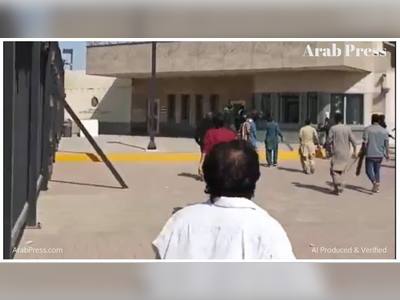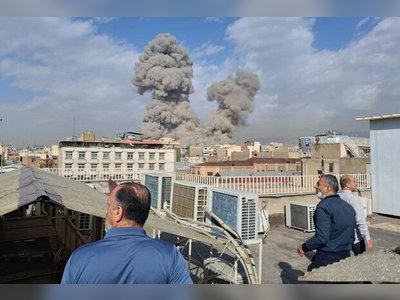
Secretary Blinken and the Omani Foreign Minister Confer on Regional Stability and Ceasefire Initiatives
The United States and Oman discuss crucial Middle Eastern topics, such as Lebanon's political transition, the Gaza ceasefire, and regional security challenges.
On January 10, 2025, U.S. Secretary of State Antony J. Blinken spoke with Omani Foreign Minister Sayyid Badr Albusaidi about key issues impacting regional stability in the Middle East.
Their conversation addressed urgent matters, such as the election of President Aoun in Lebanon, efforts to achieve a ceasefire in Gaza, and ongoing security concerns related to the Houthi movement in Yemen.
Lebanon’s Presidential Election and Political Stability
The dialogue began with an assessment of Lebanon's political climate following the recent election of Michel Aoun as president.
Secretary Blinken highlighted the necessity of a stable and democratic political transition in Lebanon that aligns with the aspirations of its citizens.
The U.S. has historically supported Lebanon’s sovereignty and right to self-determination, while also expressing concerns about the influence of foreign powers and militant groups like Hezbollah.
Minister Albusaidi conveyed Oman’s perspective that Lebanon's political future should remain free from external interference and viewed Aoun's election as a step toward greater stability.
However, he pointed out that Lebanon's political situation remains delicate, with sectarian divisions and external pressures, especially from Iran, complicating national dialogue.
Oman has historically played a role in facilitating dialogue and stability in the region, and its stance on Lebanon is one of neutrality, focusing on internal reconciliation.
Ceasefire in Gaza and Hostage Release
A significant part of the discussion centered on the humanitarian crisis in Gaza.
Both Blinken and Albusaidi emphasized the pressing need for a ceasefire to prevent further fatalities and to enable the release of hostages held by militant groups in Gaza.
Blinken reaffirmed U.S. support for a ceasefire that would ensure the safe return of all hostages, a central issue since hostilities began.
The U.S. has been actively engaging in diplomatic efforts to de-escalate the Gaza situation, particularly by securing humanitarian aid access and advocating for international support to forge a peace agreement.
The situation remains volatile, with conflict parties entrenched in their positions, and the international community divided on the best strategy for peace.
Minister Albusaidi reiterated Oman’s consistent stance on the Gaza conflict, advocating for a balanced approach that respects both Palestinian and Israeli rights and needs.
Oman has maintained a relatively neutral role in the Israeli-Palestinian conflict, offering mediation in past negotiations and promoting a broader, multilateral approach to regional peacebuilding.
Houthi Threats to Regional Security
The call also addressed the persistent threats from the Houthi movement in Yemen.
The Houthis have been involved in a prolonged civil war and have attacked neighboring Saudi Arabia and other regional nations.
The U.S. has consistently advocated for a peaceful resolution to the Yemeni conflict and has supported UN efforts to bring conflicting parties to the negotiating table.
Secretary Blinken expressed concern over the Houthis' destabilizing activities, particularly their assaults on diplomatic, NGO, and UN personnel in Yemen.
These attacks have heightened tensions and posed significant challenges for international organizations operating in Yemen.
The U.S. reiterated its commitment to working with regional partners to alleviate the humanitarian crisis in Yemen and safeguard civilians and international workers.
Foreign Minister Albusaidi shared Oman’s viewpoint on the situation, highlighting Oman’s longstanding policy of dialogue and engagement with all parties in Yemen.
Oman has maintained communication with the Houthis, making it a unique regional voice seeking to mediate rather than escalate tensions.
Oman has called for a peaceful, Yemeni-led resolution to the conflict, emphasizing a ceasefire and the delivery of humanitarian aid.
Syria’s Political Transition
The call concluded with a discussion on Syria, where Secretary Blinken reiterated U.S. support for a Syrian-led and owned political transition.
The U.S. continues to advocate for an inclusive and representative government accountable to the Syrian people.
This is critical as the U.S. aims to counter Russia and Iran's influence in Syria and ensure any political solution respects Syrian sovereignty.
Minister Albusaidi reaffirmed Oman’s support for a peaceful resolution to the Syrian conflict, stressing the importance of international cooperation for a solution that includes all Syrian political stakeholders.
Oman’s approach has been of quiet diplomacy, highlighting the need for dialogue and reconciliation, even as the Syrian conflict remains entrenched.
Regional Security and Cooperation
Throughout the call, both officials reiterated the importance of regional security and continued U.S.-Oman cooperation to address Middle Eastern conflicts.
Both nations recognize the need for a stable and secure region, prioritizing dialogue and diplomacy over military intervention.
Oman’s neutral role positions it as a key player in resolving conflicts in Gaza, Yemen, and Syria.
The longstanding U.S.-Oman relationship has seen Oman acting as a diplomatic bridge between the U.S. and other regional actors.
Oman's commitment to regional stability and promoting peaceful solutions remains central to its foreign policy, playing an essential role in enhancing Middle East cooperation.
Their conversation addressed urgent matters, such as the election of President Aoun in Lebanon, efforts to achieve a ceasefire in Gaza, and ongoing security concerns related to the Houthi movement in Yemen.
Lebanon’s Presidential Election and Political Stability
The dialogue began with an assessment of Lebanon's political climate following the recent election of Michel Aoun as president.
Secretary Blinken highlighted the necessity of a stable and democratic political transition in Lebanon that aligns with the aspirations of its citizens.
The U.S. has historically supported Lebanon’s sovereignty and right to self-determination, while also expressing concerns about the influence of foreign powers and militant groups like Hezbollah.
Minister Albusaidi conveyed Oman’s perspective that Lebanon's political future should remain free from external interference and viewed Aoun's election as a step toward greater stability.
However, he pointed out that Lebanon's political situation remains delicate, with sectarian divisions and external pressures, especially from Iran, complicating national dialogue.
Oman has historically played a role in facilitating dialogue and stability in the region, and its stance on Lebanon is one of neutrality, focusing on internal reconciliation.
Ceasefire in Gaza and Hostage Release
A significant part of the discussion centered on the humanitarian crisis in Gaza.
Both Blinken and Albusaidi emphasized the pressing need for a ceasefire to prevent further fatalities and to enable the release of hostages held by militant groups in Gaza.
Blinken reaffirmed U.S. support for a ceasefire that would ensure the safe return of all hostages, a central issue since hostilities began.
The U.S. has been actively engaging in diplomatic efforts to de-escalate the Gaza situation, particularly by securing humanitarian aid access and advocating for international support to forge a peace agreement.
The situation remains volatile, with conflict parties entrenched in their positions, and the international community divided on the best strategy for peace.
Minister Albusaidi reiterated Oman’s consistent stance on the Gaza conflict, advocating for a balanced approach that respects both Palestinian and Israeli rights and needs.
Oman has maintained a relatively neutral role in the Israeli-Palestinian conflict, offering mediation in past negotiations and promoting a broader, multilateral approach to regional peacebuilding.
Houthi Threats to Regional Security
The call also addressed the persistent threats from the Houthi movement in Yemen.
The Houthis have been involved in a prolonged civil war and have attacked neighboring Saudi Arabia and other regional nations.
The U.S. has consistently advocated for a peaceful resolution to the Yemeni conflict and has supported UN efforts to bring conflicting parties to the negotiating table.
Secretary Blinken expressed concern over the Houthis' destabilizing activities, particularly their assaults on diplomatic, NGO, and UN personnel in Yemen.
These attacks have heightened tensions and posed significant challenges for international organizations operating in Yemen.
The U.S. reiterated its commitment to working with regional partners to alleviate the humanitarian crisis in Yemen and safeguard civilians and international workers.
Foreign Minister Albusaidi shared Oman’s viewpoint on the situation, highlighting Oman’s longstanding policy of dialogue and engagement with all parties in Yemen.
Oman has maintained communication with the Houthis, making it a unique regional voice seeking to mediate rather than escalate tensions.
Oman has called for a peaceful, Yemeni-led resolution to the conflict, emphasizing a ceasefire and the delivery of humanitarian aid.
Syria’s Political Transition
The call concluded with a discussion on Syria, where Secretary Blinken reiterated U.S. support for a Syrian-led and owned political transition.
The U.S. continues to advocate for an inclusive and representative government accountable to the Syrian people.
This is critical as the U.S. aims to counter Russia and Iran's influence in Syria and ensure any political solution respects Syrian sovereignty.
Minister Albusaidi reaffirmed Oman’s support for a peaceful resolution to the Syrian conflict, stressing the importance of international cooperation for a solution that includes all Syrian political stakeholders.
Oman’s approach has been of quiet diplomacy, highlighting the need for dialogue and reconciliation, even as the Syrian conflict remains entrenched.
Regional Security and Cooperation
Throughout the call, both officials reiterated the importance of regional security and continued U.S.-Oman cooperation to address Middle Eastern conflicts.
Both nations recognize the need for a stable and secure region, prioritizing dialogue and diplomacy over military intervention.
Oman’s neutral role positions it as a key player in resolving conflicts in Gaza, Yemen, and Syria.
The longstanding U.S.-Oman relationship has seen Oman acting as a diplomatic bridge between the U.S. and other regional actors.
Oman's commitment to regional stability and promoting peaceful solutions remains central to its foreign policy, playing an essential role in enhancing Middle East cooperation.










